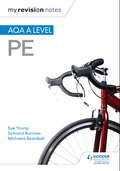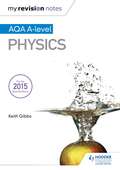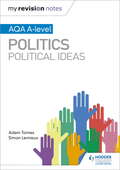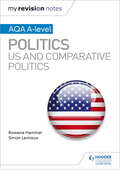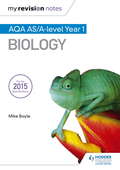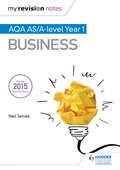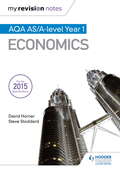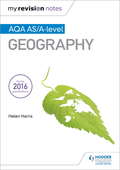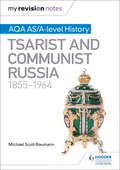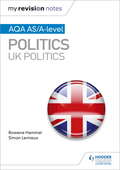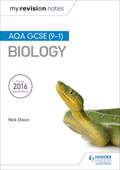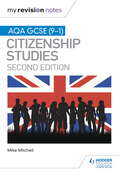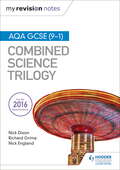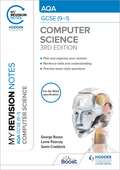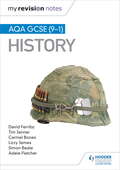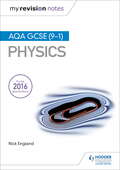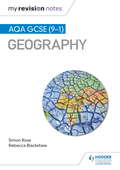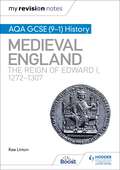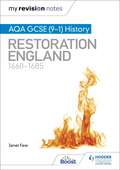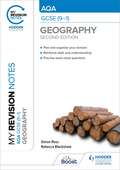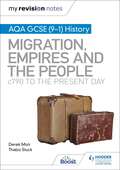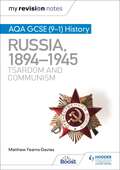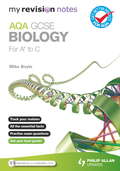- Table View
- List View
My Revision Notes: AQA A-level PE
by Symond Burrows Sue Young Michaela ByrneTarget success in PE with this proven formula for effective, structured revision; key content coverage is combined with exam-style tasks and practical tips to create a revision guide that students can rely on to review, strengthen and test their knowledge.With My Revision Notes, every student can:Plan and manage a successful revision programme using the topic-by-topic plannerConsolidate subject knowledge by working through clear and focused content coverageTest understanding and identify areas for improvement with regular 'Now Test Yourself' tasks and answersImprove exam technique through practice questions, expert tips and examples of typical mistakes to avoidGet exam ready with extra quick quizzes and answers to the practice questions available online
My Revision Notes: AQA A-level Physics
by Keith GibbsWith My Revision Notes: AQA A Level Physics you can:- Manage your own revision with step-by-step support from experienced teacher and examiner Keith Gibbs- Apply biological terms accurately with the help of definitions and key words- Plan and pace your revision with the revision planner- Test understanding with questions throughout the book- Get exam ready with last minute quick quizzes available on the Hodder Education website
My Revision Notes: AQA A-level Politics: Political Ideas
by Simon Lemieux Adam TomesWWith My Revision Notes, every student can- Plan and manage a successful revision programme using the topic-by-topic planner- Consolidate subject knowledge by working through clear and focused content coverage- Test understanding and identify areas for improvement with regular 'Now Test Yourself' tasks and answers- Improve exam technique through practice questions, expert tips and examples of typical mistakesto avoid
My Revision Notes: AQA A-level Politics: US and Comparative Politics
by Simon Lemieux Rowena HammalWith My Revision Notes, every student can:- Plan and manage a successful revision programme using the topic-by-topic planner- Consolidate subject knowledge by working through clear and focused content coverage- Test understanding and identify areas for improvement with regular 'Now Test Yourself' tasks and answers- Improve exam technique through practice questions, expert tips and examples of typical mistakes to avoid
My Revision Notes: AQA AS Biology Second Edition
by Mike BoyleWith My Revision Notes you can:- Manage your own revision with step-by-step support from experienced teacher and former examiner Mike Boyle- Apply biological terms accurately with the help of definitions and key words- Plan and pace your revision with the revision planner- Test understanding with questions throughout the book- Get exam ready with last minute quick quizzes available on the Hodder Education website
My Revision Notes: AQA AS Business Second Edition
by Malcolm Surridge Neil JamesManage your own revision with step-by-step support from experienced teacher and examiner Neil James. Use specific case studies to improve your knowledge of business processes and topics. Apply business terms accurately with the help of definitions and key words.- Plan and pace your revision with the revision planner- Use the expert tips to clarify key points- Avoid making typical mistakes with expert advice- Test yourself with end-of-topic questions and answers and tick off each topic as you complete it- Get exam ready with last minute quick quizzes at www.hoddereducation.co.uk/myrevisionnotes
My Revision Notes: AQA AS Economics
by David Horner Steve StoddardManage your own revision with step-by-step support from experienced teachers and examiners David Horner and Steve Stoddard. Use specific examples to place economic theory in a real-world context. Apply economic terms accurately with the help of definitions and key words.- Plan and pace your revision with the revision planner- Use the expert tips to clarify key points- Avoid making typical mistakes with expert advice- Test yourself with end-of-topic questions and answers and tick off each topic as you complete it- Get exam ready with last minute quick quizzes at www.hoddereducation.co.uk/myrevisionnotes
My Revision Notes: AQA AS/A-level Geography
by Helen HarrisTarget success in AQA AS/A-level Geography with this proven formula for effective, structured revision; key content coverage is combined with exam-style tasks and practical tips to create a revision guide that students can rely on to review, strengthen and test their knowledge.With My Revision Notes every student can:- Plan and manage a successful revision programme using the topic-by-topic planner- Consolidate subject knowledge by working through clear and focused content coverage- Test understanding and identify areas for improvement with regular 'Now Test Yourself' tasks and answers- Enhance exam responses using relevant case studies for each topic- Improve exam technique through practice questions, expert tips and examples of typical mistakes to avoid
My Revision Notes: AQA AS/A-level History: Tsarist and Communist Russia, 1855-1964
by Michael Scott-BaumannExam Board: AQALevel: AS/A-levelSubject: HistoryFirst Teaching: September 2015First Exam: June 2016Target success in AQA AS/A-level History with this proven formula for effective, structured revision; key content coverage is combined with exam preparation activities and exam-style questions to create a revision guide that students can rely on to review, strengthen and test their knowledge.- Enables students to plan and manage a successful revision programme using the topic-by-topic planner- Consolidates knowledge with clear and focused content coverage, organised into easy-to-revise chunks- Encourages active revision by closely combining historical content with related activities- Helps students build, practise and enhance their exam skills as they progress through activities set at three different levels- Improves exam technique through exam-style questions with sample answers and commentary from expert authors and teachers- Boosts historical knowledge with a useful glossary and timeline
My Revision Notes: AQA AS/A-level Politics: UK Politics
by Simon Lemieux Rowena HammalExam board: AQA Level: A-levelSubject: PoliticsFirst teaching: September 2017First exams: Summer 2018 (AS); Summer 2019 (A-level)With My Revision Notes, every student can:- Plan and manage a successful revision programme using the topic-by-topic planner- Consolidate subject knowledge by working through clear and focused content coverage- Test understanding and identify areas for improvement with regular 'Now Test Yourself' tasks and answers- Improve exam technique through practice questions, expert tips and examples of typical mistakes to avoid
My Revision Notes: AQA GCSE (9-1) Biology
by Nick DixonExam Board: AQALevel: GCSESubject: BiologyFirst Teaching: September 2016First Exam: Summer 2018Unlock your students' full potential with these revision guides from our best-selling series My Revision NotesWith My Revision Notes your students can:- Manage their own revision with step-by-step support from experienced teachers with examining experience.- Apply scientific terms accurately with the help of definitions and key words.- Prepare for practicals with questions based on practical work.- Focus on the key points from each topic- Plan and pace their revision with the revision planner.- Test understanding with end-of-topic questions and answers.- Get exam ready with last minute quick quizzes available on the Hodder Education Website.
My Revision Notes: AQA GCSE (9-1) Chemistry
by Richard GrimeExam Board: AQALevel: GCSESubject: ChemistryFirst Teaching: September 2016First Exam: Summer 2018Unlock your students' full potential with these revision guides from our best-selling series My Revision NotesWith My Revision Notes your students can:- Manage their own revision with step-by-step support from experienced teachers with examining experience.- Apply scientific terms accurately with the help of definitions and key words.- Prepare for practicals with questions based on practical work.- Focus on the key points from each topic- Plan and pace their revision with the revision planner.- Test understanding with end-of-topic questions and answers.- Get exam ready with last minute quick quizzes available on the Hodder Education Website.
My Revision Notes: AQA GCSE (9-1) Citizenship Studies Second Edition
by Mike MitchellTarget success in AQA GCSE Citizenship Studies with this proven formula for effective, structured revision; key content coverage is combined with exam-style tasks and practical tips to create a revision guide that students can rely on to review, strengthen and test their knowledge.- Enables students to plan and manage a successful revision programme using the topic-by-topic planner- Consolidates knowledge with clear and focused content coverage, organised into easy-to-revise chunks- Improves exam technique through exam-style questions with sample answers and expert tips
My Revision Notes: AQA GCSE (9-1) Combined Science Trilogy
by Nick England Nick Dixon Richard GrimeExam Board: AQALevel: GCSESubject: Combined ScienceFirst Teaching: September 2016First Exam: Summer 2018Unlock your students' full potential with these revision guides from our best-selling series My Revision NotesWith My Revision Notes your students can:- Manage their own revision with step-by-step support from experienced teachers with examining experience.- Apply scientific terms accurately with the help of definitions and key words.- Prepare for practicals with questions based on practical work.- Focus on the key points from each topic- Plan and pace their revision with the revision planner.- Test understanding with end-of-topic questions and answers.- Get exam ready with last minute quick quizzes available on the Hodder Education Website.
My Revision Notes: AQA GCSE (9-1) Computer Science, Third Edition
by George Rouse Gavin Craddock Lorne PearceyTarget exam success with My Revision Notes. Our updated approach to revision will help students learn, practise and apply skills and understanding. Coverage of key content is combined with practical study tips and effective revision strategies to create a guide students can rely on to build both knowledge and confidence.My Revision Notes: AQA GCSE Computer Science will help students:> Strengthen subject knowledge and key terms by working through clear and focused key content> Test understanding and identify areas for improvement with 'check your understanding' questions> Plan and manage a successful revision programme with the 'exam breakdown', 'countdown to the exams' and 'now test yourself' sections> Check answers to the practice questions against the answers provided> Enhance exam technique through exam-style questions and tips from a leading team of expert authors
My Revision Notes: AQA GCSE (9-1) History
by David Ferriby Tim Jenner Simon BealeTarget success in AQA GCSE (9-1) History with this proven formula for effective, structured revision; key content coverage is combined with exam-style questions, revision tasks and practical tips to create a revision guide that students can rely on to review, strengthen and test their knowledge.With My Revision Notes every student can:- Plan and manage a successful revision programme using the topic-by-topic planner- Enjoy an interactive approach to revision, with clear topic summaries that consolidate knowledge and related activities that put the content into context- Build, practise and enhance exam skills by progressing through revision tasks and Test Yourself activities- Improve exam technique through exam-style questions and sample answers with commentary from expert authors and teachers- Get exam ready with extra quick quizzes and answers to the activities available onlineThis title covers the following options:Period studies- Germany, 1890-1945: Democracy and dictatorship- America, 1920-1973: Opportunity and inequalityWider world depth studies- Conflict and tension, 1918-1939- Conflict and tension between East and West, 1945-1972- Conflict and tension in Asia, 1950-1975Thematic studies- Britain: Health and the people: c1000 to the present day- Britain: Power and the people: c1170 to the present dayBritish depth studies- Norman England, c1066-c1100- Elizabethan England, c1568-1603
My Revision Notes: AQA GCSE (9-1) Physics
by Nick EnglandExam Board: AQALevel: GCSESubject: PhysicsFirst Teaching: September 2016First Exam: Summer 2018Unlock your students' full potential with these revision guides from our best-selling series My Revision Notes.With My Revision Notes your students can:- Manage their own revision with step-by-step support from experienced teachers with examining experience.- Apply scientific terms accurately with the help of definitions and key words.- Prepare for practicals with questions based on practical work.- Focus on the key points from each topic- Plan and pace their revision with the revision planner.- Test understanding with end-of-topic questions and answers.- Get exam ready with last minute quick quizzes available on the Hodder Education Website.
My Revision Notes: AQA GCSE (91) Geography
by Simon Ross Rebecca BlackshawExam Board: AQALevel: GCSESubject: GeographyFirst Teaching: September 2016First Exam: Summer 2018Target success in AQA GCSE (9-1) Geography with this proven formula for effective, structured revision; key content coverage is combined with exam-style tasks and practical tips to create a revision guide that students can rely on to review, strengthen and test their knowledge.With My Revision Notes every student can:- Plan and manage a successful revision programme using the topic-by-topic planner- Enjoy an active approach to revision with clear topic coverage and related 'Now Test Yourself' tasks and practical revision activities- Improve exam technique through exam tips and formal exam-style questions- Monitor their knowledge and progress using the answers provided for each activity and exam-style question- Develop geographical understanding and enhance exam responses with case study material and event/place examples
My Revision Notes: AQA GCSE (9–1) History: Medieval England: the reign of Edward I, 1272–1307
by Rae LintonExam board: AQALevel: GCSESubject: HistoryFirst teaching: September 2016First exams: Summer 2018Target success in AQA GCSE (9-1) History with this proven formula for effective, structured revision. Key content coverage is combined with exam-style questions, revision tasks and practical tips to create a revision guide that students can rely on to review, strengthen and test their knowledge.With My Revision Notes every student can:- Plan and manage a successful revision programme using the topic-by-topic planner- Enjoy an interactive approach to revision, with clear topic summaries that consolidate knowledge and related activities that put the content into context- Build, practise and enhance exam skills by progressing through revision tasks and Test Yourself activities- Improve exam technique through exam-style questions and sample answers with commentary from expert authors and teachers- Get exam ready with extra quick quizzes and answers to the activities available onlineThis revision guide covers the British depth study 'Medieval England: the reign of Edward I, 1272-1307' (Paper 2, option BB).
My Revision Notes: AQA GCSE (9–1) History: Restoration England, 1660–1685
by Janet FewExam board: AQALevel: GCSESubject: HistoryFirst teaching: September 2016First exams: Summer 2018Target success in AQA GCSE (9-1) History with this proven formula for effective, structured revision. Key content coverage is combined with exam-style questions, revision tasks and practical tips to create a revision guide that students can rely on to review, strengthen and test their knowledge.With My Revision Notes every student can:- Plan and manage a successful revision programme using the topic-by-topic planner- Enjoy an interactive approach to revision, with clear topic summaries that consolidate knowledge and related activities that put the content into context- Build, practise and enhance exam skills by progressing through revision tasks and Test Yourself activities- Improve exam technique through exam-style questions and sample answers with commentary from expert authors and teachers- Get exam ready with extra quick quizzes and answers to the activities available onlineThis revision guide covers the British depth study 'Restoration England, 1660-1685' (Paper 2, option BD).
My Revision Notes: AQA GCSE (9–1) Geography Second Edition
by Simon Ross Rebecca BlackshawSet your students on track to achieve the best grade possible with My Revision Notes. Our updated approach to revision will help students learn, practise and apply their skills and understanding. Coverage of key content is combined with practical study tips and effective revision strategies to create a guide that can be relied on to build both knowledge and confidence.My Revision Notes: AQA GCSE (9-1) Geography will help students:- Develop subject knowledge by making links between topics for more in-depth exam answers- Plan and manage revision with our topic-by-topic planner and exam breakdown introduction- Practise and apply skills and knowledge with Exam-style questions and frequent check yourunderstanding questions, and answer guidance online- Build quick recall with bullet- pointed summaries at the end of each chapter- Understand key terms for the exam with user-friendly definitions and a glossary- Avoid common mistakes and enhance exam answers with Examiner tips- Improve subject-specific skills with an Exam skills checkbox at the end of each chapter
My Revision Notes: AQA GCSE (9–1) History: Migration, empires and the people: c790 to the present day
by Derek Moir Thabo StuckExam board: AQALevel: GCSESubject: HistoryFirst teaching: September 2016First exams: Summer 2018Target success in AQA GCSE (9-1) History with this proven formula for effective, structured revision. Key content coverage is combined with exam-style questions, revision tasks and practical tips to create a revision guide that students can rely on to review, strengthen and test their knowledge.With My Revision Notes every student can:- Plan and manage a successful revision programme using the topic-by-topic planner- Enjoy an interactive approach to revision, with clear topic summaries that consolidate knowledge and related activities that put the content into context- Build, practise and enhance exam skills by progressing through revision tasks and Test Yourself activities- Improve exam technique through exam-style questions and sample answers with commentary from expert authors and teachers- Get exam ready with extra quick quizzes and answers to the activities available onlineThis revision guide covers the thematic study 'Britain: Migration, empires and the people: c790 to the present day' (Paper 2, option AC).
My Revision Notes: AQA GCSE (9–1) History: Russia, 1894–1945: Tsardom and communism
by Matthew Fearns-DaviesExam board: AQALevel: GCSESubject: HistoryFirst teaching: September 2016First exams: Summer 2018Target success in AQA GCSE (9-1) History with this proven formula for effective, structured revision. Key content coverage is combined with exam-style questions, revision tasks and practical tips to create a revision guide that students can rely on to review, strengthen and test their knowledge.With My Revision Notes every student can:- Plan and manage a successful revision programme using the topic-by-topic planner- Enjoy an interactive approach to revision, with clear topic summaries that consolidate knowledge and related activities that put the content into context- Build, practise and enhance exam skills by progressing through revision tasks and Test Yourself activities- Improve exam technique through exam-style questions and sample answers with commentary from expert authors and teachers- Get exam ready with extra quick quizzes and answers to the activities available onlineThis revision guide covers the period study 'Russia, 1894-1945: Tsardom and communism' (Paper 1, option AC).
My Revision Notes: AQA GCSE Biology (for A* to C) ePub
by Mike BoyleAiming for your very best grades in AQA GCSE Biology? This revision guide will support you every step of the way.My Revision Notes (for A* to C): AQA GCSE Biology will help you revise effectively in the way you want to, allowing you to plan and pace your revision according to your learning needs, and to adapt and personalise with your own notes. Written by experienced teachers and examiners, you can be confident that this guide will cover only the facts and ideas you will be expected to recall and be able to use. With My Revision Notes (for A* to C): AQA GCSE Biology, essential facts are organised into memorable portions to make revising easier. Each double-page spread summarises a key topic for AQA GCSE Biology and is packed with questions and quick-fire quizzes so you can test your understanding and track your progress. Exam tips and hints then show you how to avoid losing marks and get the best grades. With additional online support and advice on using terms and applying your scientific skills, this guide will help you prepare for your top grades.
My Revision Notes: AQA GCSE Chemistry (for A* to C) ePub
by Philip DobsonAiming for your very best grades in AQA GCSE Chemistry? This revision guide will support you every step of the way.My Revision Notes (for A* to C): AQA GCSE Chemistry will help you revise effectively in the way you want to, allowing you to plan and pace your revision according to your learning needs, and to adapt and personalise with your own notes. Written by experienced teachers and examiners, you can be confident that this guide will cover only the facts and ideas you will be expected to recall and be able to use. With My Revision Notes (for A* to C): AQA GCSE Chemistry, essential facts are organised into memorable portions to make revising easier. Each double-page spread summarises a key topic for AQA GCSE Chemistry and is packed with questions and quick-fire quizzes so you can test your understanding and track your progress. Exam tips and hints then show you how to avoid losing marks and get the best grades. With additional online support and advice on using terms and applying your scientific skills, this guide will help you prepare for your top grades.
